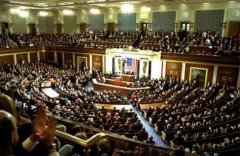Political Corruption and Fear used to approve Patriot Act Provisions
May 27, 2011
Americans will live without civil liberties and under ‘state of emergency’ for at least four more years
Politico
May 26, 2011
Capping a week of political bickering and parliamentary delays, the House joined the Senate on Thursday to pass a four-year extension of key provisions of the Patriot Act that was set to expire at midnight.
Because President Barack Obama was traveling in Europe, he signed the bill into law using an autopen, a machine that replicates the president’s signature.
The House voted 250-153 to renew three parts of the counter-terrorism surveillance law. Thirty-one House Republicans joined most Democrats in opposing the extension, while 54 Democrats supported it.
Hours earlier, the bill cleared the Senate on a 72-23 vote, with 19 Democrats and four Republicans voting no, mostly over concerns the Patriot Act violates personal privacy and civil liberties.
The week-long fight over parliamentary procedures and amendments left a trail of bruised egos and bad feelings in the upper chamber.
Freshman Sen. Rand Paul (R-Ky.), a Patriot Act opponent who had used procedural tactics to delay a final vote on the bill for much of the week, eventually worked out a deal with Senate Majority Leader Harry Reid (D-Nev.) to get votes on two of his amendments – but not before Reid accused the libertarian, tea-party darling of “political grandstanding” and trying to protect terrorists.
While Paul’s amendments ultimately failed by wide margins, Republican leaders blocked Senate Judiciary Committee Chairman Patrick Leahy (D-Vt.) from even getting a vote on his bipartisan amendment that would have required greater congressional oversight of the anti-terrorism tools in the law.
Leahy briefly threatened to delay the final vote himself – a rare move for the chairman tasked with shepherding the bill through the Senate. But he later backed off, vowing to introduce his amendment as a stand-alone bill.
“I do feel this really ruins the chances to make the Patriot Act one that could have had far, far greater bipartisan support, and we have lost a wonderful chance,” Leahy said on the Senate floor, “but I understand that we have to do what the Republicans want on this bill.”
The longtime liberal from Vermont voted no and rejected assertions by Republicans that his objections would have been to blame for the Patriot Act provisions expiring, something top Obama administration officials warned could threaten national security during a time of heightened alert.
“There is no conceivable way this thing can get passed and signed by the president anyway [before the provisions expire],” Leahy told two reporters before the vote, unaware that the White House intended to attach the president’s signature via autopen. “So that was the most bogus, damn argument that’s been made in this place today.”
When asked if Reid, his party’s leader, had poorly managed the amendment process, Leahy replied: “I can’t even answer that with a straight face.”
But one Republican member of the Senate Armed Services Committee said Reid had waited until the last minute to limit amendments and force people to get on board the Patriot Act.
“We should never have gotten into the situation where leadership feels they could achieve a result by pushing this right up to the deadline and then hoping people cave. It’s not the way it should work,” the senator said. “This is Harry Reid’s style to basically avoid votes and make agreements that don’t always stick in an effort to save his members from tough votes.”
Read Full Article…

